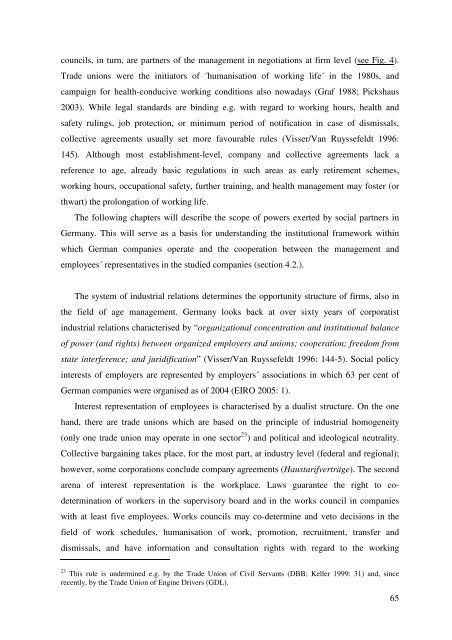Dissertation_Paula Aleksandrowicz_12 ... - Jacobs University
Dissertation_Paula Aleksandrowicz_12 ... - Jacobs University
Dissertation_Paula Aleksandrowicz_12 ... - Jacobs University
You also want an ePaper? Increase the reach of your titles
YUMPU automatically turns print PDFs into web optimized ePapers that Google loves.
councils, in turn, are partners of the management in negotiations at firm level (see Fig. 4).<br />
Trade unions were the initiators of ´humanisation of working life´ in the 1980s, and<br />
campaign for health-conducive working conditions also nowadays (Graf 1988; Pickshaus<br />
2003). While legal standards are binding e.g. with regard to working hours, health and<br />
safety rulings, job protection, or minimum period of notification in case of dismissals,<br />
collective agreements usually set more favourable rules (Visser/Van Ruyssefeldt 1996:<br />
145). Although most establishment-level, company and collective agreements lack a<br />
reference to age, already basic regulations in such areas as early retirement schemes,<br />
working hours, occupational safety, further training, and health management may foster (or<br />
thwart) the prolongation of working life.<br />
The following chapters will describe the scope of powers exerted by social partners in<br />
Germany. This will serve as a basis for understanding the institutional framework within<br />
which German companies operate and the cooperation between the management and<br />
employees´ representatives in the studied companies (section 4.2.).<br />
The system of industrial relations determines the opportunity structure of firms, also in<br />
the field of age management. Germany looks back at over sixty years of corporatist<br />
industrial relations characterised by “organizational concentration and institutional balance<br />
of power (and rights) between organized employers and unions; cooperation; freedom from<br />
state interference; and juridification” (Visser/Van Ruyssefeldt 1996: 144-5). Social policy<br />
interests of employers are represented by employers´ associations in which 63 per cent of<br />
German companies were organised as of 2004 (EIRO 2005: 1).<br />
Interest representation of employees is characterised by a dualist structure. On the one<br />
hand, there are trade unions which are based on the principle of industrial homogeneity<br />
(only one trade union may operate in one sector 23 ) and political and ideological neutrality.<br />
Collective bargaining takes place, for the most part, at industry level (federal and regional);<br />
however, some corporations conclude company agreements (Haustarifverträge). The second<br />
arena of interest representation is the workplace. Laws guarantee the right to codetermination<br />
of workers in the supervisory board and in the works council in companies<br />
with at least five employees. Works councils may co-determine and veto decisions in the<br />
field of work schedules, humanisation of work, promotion, recruitment, transfer and<br />
dismissals, and have information and consultation rights with regard to the working<br />
23 This rule is undermined e.g. by the Trade Union of Civil Servants (DBB; Keller 1999: 31) and, since<br />
recently, by the Trade Union of Engine Drivers (GDL).<br />
65
















